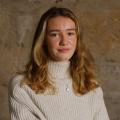
A GLASGOW-BORN scientist has been posthumously honoured for her discovery of coronavirus.
On Friday last week, more than 50 years on from her discovery, Dr June Almeida was given a prize by the Baird of Bute society in the RAF Club in London by the club’s patron, Sir Stephen Hillier. The Special Recognition Award was dedicated to Almeida, who died in 2007. Born in Glasgow in 1930, she was a pioneer in the field of virology.
In 1966, using immune electron microscopy technique, she identified a previously unknown virus in humans – later christened “coronavirus”. In the midst of the Covid-19 pandemic, her work provided an understanding of the virus structure, upon which subsequent research has allowed the development of vaccines which are being used protect us from the more serious
impacts of the virus. Her feat was remarkable. The then-36 year-old scientist had left school at the age of 16. Born June Hart, she lived with her family in Dennistoun; her father a bus driver and her mother a shop assistant. A student at Whitehill Secondary, she had ambitions to attend university. But, as money was scarce, she left school and started work as a histopathology lab technician at the Glasgow Royal Infirmary.
READ MORE: Covid in Scotland: Where are the coronavirus cases today?
Here, a career in science was ignited, as the nature of the work required the use of a light microscope to analyse tissue samples. A move to London saw her take up a similar position at St Bartholomew’s Hospital. In London, she met and married a Venezuelan artist, Enrique Almeida.
In 1954, they immigrated to Toronto, Canada, where Almeida began working with an electron microscope at the Ontario Cancer Institute.
She soon began to develop skills that were recognised by others in the field of virology as unique. In 1963, she wrote an important paper setting out a suggested framework for the classification of virus particles.
In 1966, working at St Thomas’s Hospital Medical School, she identified a new virus responsible for causing cold symptoms in a group of boarding school boys. She co-authored a paper about the discovery, in which the new virus was given the name coronavirus, due to its surrounding spikes resembling a solar corona.
READ MORE: Covid Scotland: Record-breaking levels of hospitalisations recorded
By 1967, she had earned a doctorate, and later went on to capture the first image of the rubella virus and identify the virus structure that causes hepatitis B, as well as producing some of the first high-quality photographs of the HIV virus.
Her daughter, Dr Joyce Almeida said: “My mother would be delighted to know that her story might inspire others to enter the field of science. At the heart of her many skills was her great ability to communicate and to inspire other scientists to learn the new techniques she had developed.”
Baird of Bute Society founder, Christopher Markwell, said: “We Scots should be rightly proud of Dr Almeida’s contributions, and grateful to her pioneering work so foundational to the vaccines.”
June Almeida ,Virus Detective!, a children’s book by Suzanne Slade celebrating her achievements, was published earlier this month



Why are you making commenting on The National only available to subscribers?
We know there are thousands of National readers who want to debate, argue and go back and forth in the comments section of our stories. We’ve got the most informed readers in Scotland, asking each other the big questions about the future of our country.
Unfortunately, though, these important debates are being spoiled by a vocal minority of trolls who aren’t really interested in the issues, try to derail the conversations, register under fake names, and post vile abuse.
So that’s why we’ve decided to make the ability to comment only available to our paying subscribers. That way, all the trolls who post abuse on our website will have to pay if they want to join the debate – and risk a permanent ban from the account that they subscribe with.
The conversation will go back to what it should be about – people who care passionately about the issues, but disagree constructively on what we should do about them. Let’s get that debate started!
Callum Baird, Editor of The National
Comments: Our rules
We want our comments to be a lively and valuable part of our community - a place where readers can debate and engage with the most important local issues. The ability to comment on our stories is a privilege, not a right, however, and that privilege may be withdrawn if it is abused or misused.
Please report any comments that break our rules.
Read the rules here